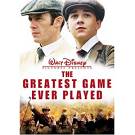|
|
||||
|
|
by Betty Jo Tucker  Overcoming social class barriers in the early 20th century wasnít easy -- either in the Twenty-year-old Francis Ouimet (Shia LaBeouf) and veteran professional golfer Harry Vardon (Stephen Dillane) square off against each other after all other contestants are eliminated in that landmark tournament. But Ouimet and Vardon arenít enemies. Ironically, both come from humble beginnings, and they respect each other. In fact, Vardon has been Ouimetís idol while growing up. The Greatest Game Ever Played paints each of these men as a hero. Perseverance, talent, and a passion for the game are among their most admirable characteristics. Delivering performances of great depth and sensitivity, LaBeouf (Holes) and Dillane (Spy Game) are simply splendid here. Who knew LaBeouf could tone down his amusing, exuberant acting to portray such an intense and serious young man? La Beouf draws us into Ouimetís world, and we canít help aching for the character he plays as he struggles with feelings of unworthiness. We gladly cheer him on when he gains the self-confidence needed to achieve his goal. In Dillaneís case, however, there was no doubt in my mind about his ability to bring Vardon to life on screen. Dillane is a very thoughtful and convincing actor. For example, as Vardon, his penetrating looks at his upper-class managers speak volumes about the manís disdain for their elitism. Other members of the cast -- especially Elias Koteas (Ararat) as Ouimetís disapproving father, Marnie McPhail (Ethel Kennedy in TVís RFK) as his supportive mother, and Josh Flitter as his funny little caddy -- also perform impeccably, but the movie belongs to La Beouf and Dillane. I noticed only one casting error: the actress playing Ouimetís love interest seems too old for him. Why throw in a romance anyway? This film certainly doesnít need one. Everything about The Greatest Game Ever Played works to evoke the time and place of this story. It has the same authentic feel as Seabiscuit or Thankfully, because golf isnít the most exciting sport for viewers (I hope my husband doesnít read this; heís watching golf on TV as Iím writing my review), Shane Hurlbutís (Drumline) cinematography livens it up with a variety of creative shots including balls zooming to their destination and the disappearance of everything on the course except the golfer and the hole heís aiming at. Kudos to director Bill Paxton (Frailty) for pulling all this together so impressively and to writer Mark Frost (Fantastic Four) for adapting his book into a wonderful screenplay. You donít have to be a golf fan to appreciate The Greatest Game Ever Played. Itís a heartfelt movie the whole family can enjoy. A highlight of the fine DVD bonus items shows real-life Francis Oiumet in a 1963 interview. Although itís a bit of a shock to see an elderly gentleman discussing the famous 1913 U.S. Open after watching young Shia LeBeoufís portrayal, this footage is a treasure. I think Oiumet, America's first golf hero, would be an excellent subject for a movie at any age. Sadly, he passed away in 1967. But his Scholarship Program for Caddies is still going strong. Other bonus features included are: A View from the Gallery, an enlightening behind-the-scenes look at the making of this classy film; Two Legends and the Greatest Game, which presents more information about Harry Vardon and Francis Ouimet; and audio commentary by director Bill Paxton and writer Mark Frost. (Released by Walt Disney Home Entertainment and rated ďPGĒ for some brief mild language. Bonus material not rated.)
|
||
|
© 2026 - ReelTalk Movie Reviews Website designed by Dot Pitch Studios, LLC |




